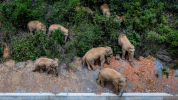Ocean
The Living Force

15 Elephants Are on a Mysterious, Epic Journey Across China - EcoWatch
Fifteen Asian elephants are in the middle of an epic journey across a Chinese province, and no one knows why. The herd first left their home in the Xishuangbanna National Nature Reserve in the spring of last year. Since then, they have covered a distance of more than 300 miles in what experts...
 www.ecowatch.com
www.ecowatch.com
A Herd of 15 Elephants Is Wandering North Across China—and Nobody Knows Why

Fifteen Asian elephants are in the middle of an epic journey across a Chinese province, and no one knows why.
The herd of elephants first left their home in the Xishuangbanna National Nature Reserve in the spring of last year. Since then, they have covered a distance of more than 300 miles in what experts say is the longest-ever trek made by elephants in China.
"It makes me think of the movie 'Nomadland,'" Zoological Society of London consultant Becky Shu Chen told The New York Times.
The elephants have been traveling northward through the southern Chinese province of Yunnan, Al Jazeera reported. Along the way, they have captured the hearts and attention of Chinese social media users, but also gotten into their fair share of trouble. They have eaten more than $1 million worth of crops, and there are reports that at least one of the elephants got drunk on fermented grain, BBC News reported.
The herd set out with 17 or 16 elephants originally, but over the more-than-a-year journey, two have turned back and one was born. As of 9:55 p.m. Wednesday, they had made it to the outskirts of the city of Kunming, which has a population of 8.5 million people, according to The New York Times.
One social media user joked that the elephants might have headed towards the city to attend the UN Biodiversity Conference slated to take place in Kunming in October, as BBC News reported. While this was said in jest, the elephants might have serious grievances to bring to such a gathering. Some argue that the unusual journey was set off by habitat loss.
"The main driver is the decrease and fragmentation of the rainforest, where they live," Pan Wenjing of Greenpeace East Asia told Al Jazeera." And the reason is because of the expansion of human activities such as plantations, for example, tea and rubber as well as constructions."
At the same time as the elephants' habitat has been reduced, their numbers have increased. Asian elephants are an endangered species according to the International Union for Conservation of Nature Red List, but their population has jumped in the past several decades from fewer than 200 to around 300, The New York Times pointed out. As the bigger population has interacted more with humans, it has also discovered the appeal of human-grown food.
"Elephants learned there is so much food, it's so nutritious, it's so easy to harvest and it's safe," Dr. Ahimsa Campos-Arceiz, a principal investigator at the Xishuangbanna Tropical Botanical Garden, told The New York Times. "This means that elephants have been going back to places where they had been absent for a long time."
Now, the government is using food to try and lure the animals away from humans, and setting up roadblocks to urge them back home, according to Al Jazeera. For now, however, their incredible journey continues.
